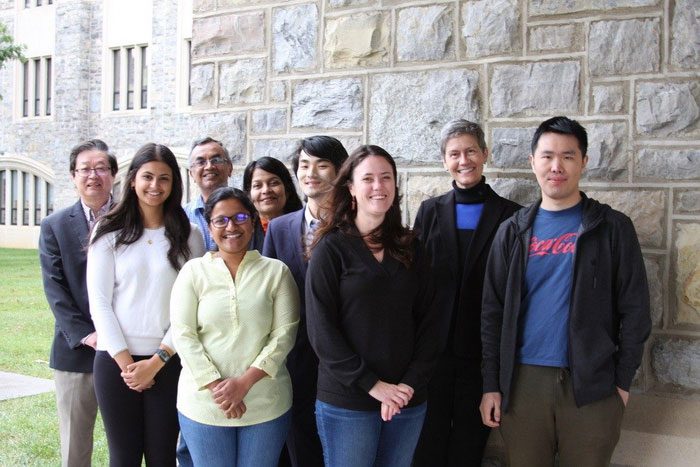Complex, ill-structured, and thorny challenges require a convergence of expertise to advance beyond disciplinary boundaries and develop new frameworks for problem-solving.
While COVID-19 is only one among many zoonotic viral diseases, its spread to pandemic proportions has highlighted important scientific, societal, and ethical aspects that require consideration for the successful prediction and prevention of further pandemics.
T.M. Murali, a professor in the Department of Computer Science, along with several colleagues from across Virginia Tech, has received a $1 million National Science Foundation grant to tackle grand challenges in the prediction and prevention of infectious disease pandemics. The award comes from the Predictive Intelligence for Pandemic Prevention (PIPP) program, which provides an opportunity for multidisciplinary teams to work across scientific and other disciplinary divides to implement an effective approach to pandemic predictive intelligence.
Murali, principal investigator in the grant, and the research team use the convergent power of their expertise to identify expedient, efficient, cost-effective options for the prevention and containment of zoonotic viruses.
X.J. Meng, co-principal investigator, University Distinguished Professor of Molecular Virology at the Virginia-Maryland College of Veterinary Medicine and professor of internal medicine at the Virginia Tech Carilion School of Medicine, said the university is well positioned to meet this challenge, citing the interdisciplinary and collaborative research taking place in the Center for Emerging, Zoonotic, and Arthropod-borne Pathogens (CeZAP), one of the four core centers within the Fralin Life Sciences Institute.
“With the establishment of CeZAP in 2020, and now with this PIPP Phase I center award on pandemic prevention led by Dr. Murali, Virginia Tech is on an upward trajectory to become a leader in infectious disease research and pandemic prevention,” said Meng.
Over the next 18 months, this team of experts will be scaling up coordination and mapping convergence opportunities to build the research capacity that will make Virginia Tech highly competitive for a national-level center. With the goal of predicting and preventing future pandemics using novel approaches to research and transdisciplinary problem-solving, the team will use its professional and technical expertise to develop a common discourse and shared research agenda across three cross-cutting themes. The work conducted in each theme will inform and be informed by the discoveries in the other themes.
Theme 1: Computational prediction of viral adaptation to human cells
James Weger-Lucarelli, an assistant professor in the Department of Biomedical Sciences and Pathobiology in the Virginia-Maryland College of Veterinary Medicine, and Anuj Karpatne, an assistant professor in the Department of Computer Science, will lend their expertise to developing computational and experimental methods to analyze the genomic sequences of viruses that currently infect animals. Determining how those viruses evolve in order to cross species barriers will lead to the development of predictive, science-guided machine learning models necessary for the effective development of interventions.
Critical to the development of these predictive models of zoonotic viral behaviors is work conducted by Padma Rajagopalan, the Robert E. Hord, Jr. professor in the Department of Chemical Engineering, a fellow of the American Institute for Medical and Biological Engineering, and the program director for the interdisciplinary graduate program on Computational Tissue Engineering. Rajagopalan shares her expertise in 3D tissues, also known as organoids. “These organoids are lab-assembled and comprise almost all the cells found in a specific tissue,” she said. “We need these kind of tissues because they are the closest we can get before doing animal testing. Because they are 3D in nature, they can provide knowledge and insight as to what happens inside the body.”
Theme 2: Rapid repurposing and redesign of drugs to prevent viral replication
Determining the evolutionary behaviors of viruses that move between animal and human hosts and their subsequent actions on tissues provides foundational data to support the identification, repurposing, and redesign of existing drugs that may be used in the prevention and replication of zoonotic viruses.
Sanket Deshmukh, an associate professor in the Department of Chemical Engineering; Laura Hungerford, professor of veterinary public health and epidemiology and the department head for the Department of Population Health Sciences in the Virginia-Maryland College of Veterinary Medicine; and Paul R. Skolnik, infectious disease physician and professor at the Virginia Tech Carilion School of Medicine, all contribute their expertise to explore the appropriateness of existing drug compounds, chemistry, design, and effectiveness to prevent viruses from evolving and/or replicating.
Theme 3: Community-informed research
Despite the successful development and approval of multiple effective vaccines against SARS-CoV-2, the adoption of new pharmaceutical interventions has proven to be a barrier.
Specifically in the United States, societal resistance to vaccination has considerably hindered the ability of public health agencies to curb infections. Murali believes that one of the distinctive factors setting Virginia Tech’s proposal apart from its peers was the deep integration of community engagement.
“What we realized in the COVID-19 pandemic is that health professionals have to build trust with the community and scientists need to be informed about what the concerns are,” said Murali. As such, the investigators will engage with the community at large to develop an understanding of societal and ethical concerns of the research.
For Kathy Hosig, an associate professor in the Department of Population Health Sciences and director of the Virginia Tech Center for Public Health Practice and Research, this work is vitally important to public health, particularly for alleviating health inequities. “Bringing transdisciplinary teams together to tackle public health issues such as pandemic prediction and prevention will build capacity for both researchers and communities to efficiently and effectively address current and future health threats,” she said.


